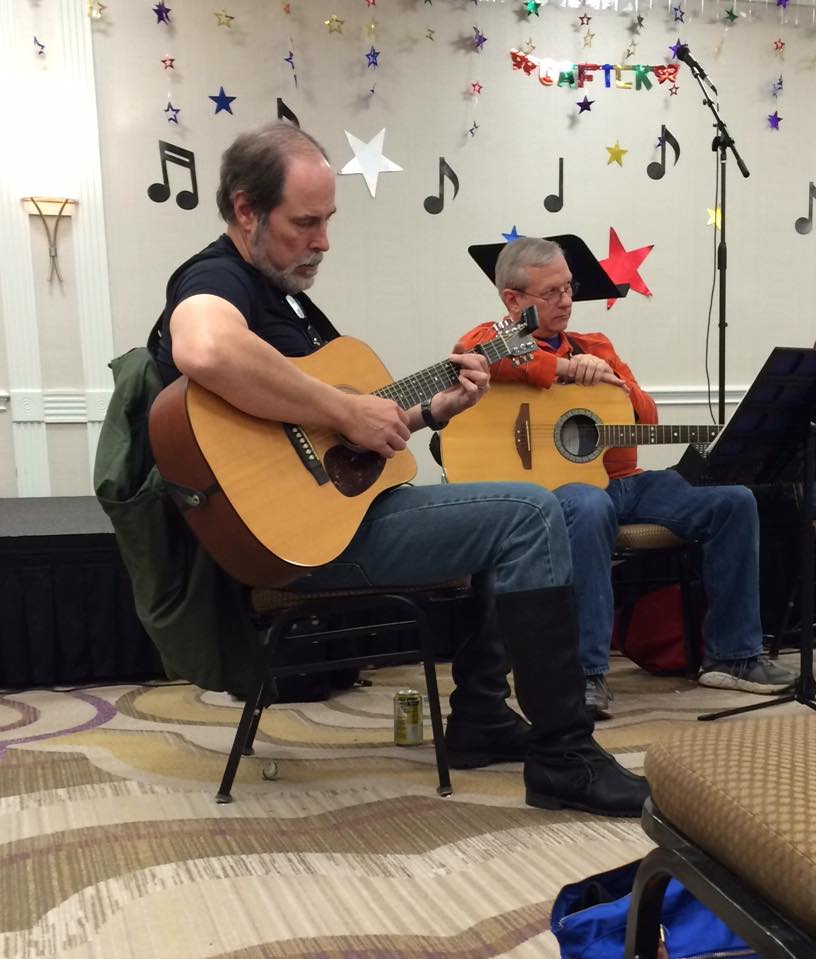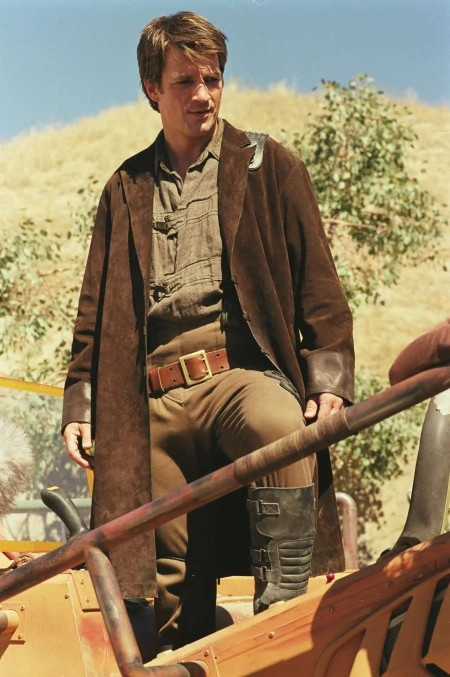Last weekend I failed miserably at being in two places at one time.
For several years, on the second weekend of January I’ve attended illogiCon, a fun little fan-run science fiction and fantasy convention in the Research Triangle; this year, however, I changed things up a little and attended GAFilk, the Georgia Filk Convention, in Atlanta. This was the first convention I’ve ever attended that was dedicated to filk, i.e., primarily to the music of fandom. I had a good time, but I found myself wishing I could’ve gone to both!
GAFilk is a “relaxacon,” and as such is a very low-key affair. Being a smallish convention, it was not divided into multiple programming tracks and did not offer a variety of simultaneous events. Almost everything took place in a single ballroom!

(L-R: Michael Longcor, GAFilk Guest of Honor, and yours truly, during “open filk.” Photo by Amber Hansford, used by permission.)
So, how did it go?
The Good. At most conventions, the best part is seeing friends that I only see a few times a year, and GAFilk was no different. In fact, I was quite pleased at seeing many friendly faces I recognized from other conventions. Also, it was nice to meet face-to-face some of the people I had previously interviewed on the Baen Free Radio Hour podcast.
The programming consisted primarily of concerts featuring the variety of guests, but a few other events were included. The opening ceremony on Friday night, for instance, include a champagne toast to the “Fannish New Year” and segued into an amusing “My Filk” game show that featured two competing panels and a variety of filk-related questions. My favorite game-within-the-game was “Second Line,” in which the emcee read the second line of a song and contestants got points if they could identify the song title, the performer, and/or the opening line.
The first concert featured Erin and Rand Bellavia, the “Con Committee’s Choice.” Rand is well-known as the co-founder of the band Ookla the Mok, and he and Erin put on a very good show. Actually, all of the concerts were quite good: toastmistress Judi Miller enlisted the aid of several friends during her show (as well as adding verve to almost all the proceedings with her enthusiastic American Sign Language interpretations); Interfilk guest Glen Raphael’s set included not only his original songs but also my favorite song from Carla Ulbrich’s latest album (viz., “Totally Average Woman”); and Guest of Honor Michael Longcor played a great set despite the distractions of Ms. Miller’s exuberant signing. “Super-Secret Guest” Elizabeth Moon’s concert was more of a reading and Q&A session, but was nevertheless delightful.
The “2 x 10” concert session was also enjoyable. Attendees signed up for 10-minute slots during which they presented 2 songs — hence the name. I signed up, too, and sang “A Ship With No Name” and “Another Romulan Ale”. And of course every night featured open filking into the wee hours of the morning!
The Not So Good. The worst part of GAFilk was the headache I developed on Saturday night. I blame the fact that I sat directly in front of and very close to the banquet band’s main speaker. Shortly after sitting down I wished I had brought my ear plugs with me (I always travel with them, but they were upstairs in my room), and shortly after eating I excused myself, returned to my room, took some medicine and tried to relax. My head was still hurting when I went to Elizabeth Moon’s “concert,” so I didn’t mind it being a low-key event. I went back upstairs and lay down for a bit after that, so I missed the auction, but I made myself go to the first hour or so of the open filk before I called it a night.
Also on the “not so good” side, though I suppose I should have expected it, was the emergence of the “Sad Puppies” controversy during Friday night’s open filking.* I’m not sure if the fellow at the other end of the filk circle knew, when he sang the line “they’re all bad writers,” that one of the SP3 authors was listening to him croon. (I was tempted to ask him how many of my published stories he’d read, and what specific flaws in them led him to the conclusion that I was a bad writer, but I demurred; I suspect I know the answer and it’s something less than one.) In the filk circle tradition of following a song with another in the same vein, two other people sang “Sad Puppy” songs after the first one, which I suppose I also should have expected. Again I didn’t make any sort of deal about it: I said nothing, just as I say nothing when, occasionally, I find other particular songs distasteful or objectionable. The artists are well within their rights to express themselves as they see fit.
There and Back Again. All told, GAFilk was a good experience and is a pleasant little convention. I’m more used to general conventions at which I have definite responsibilities (go to this room, at this time, to talk about this subject), so to a certain extent I failed at the kind of laid-back, low-stress attendance expected at a “relaxacon.” Despite my inability to relax into the event, for the most part I had a good time.
I wish I had the skill to be in multiple places at the same time, because then I wouldn’t be faced with the illogiCon-or-GAFilk question. The first is a general convention, a little over 6 miles from my house; the second is a specialized convention, a little over 6 hours away. Simply from a logistics standpoint, I suspect next year will find me staying closer to home; but, stranger things have happened!
Anyway, kudos to the Con Committee and all the volunteers for putting on a fine convention. If you’re looking for a low-key, music-oriented fan experience in early January, I encourage you to consider GAFilk!
___
*No, I’m not going to take time in this post to explain what the controversy was (or is). Look up “2015 Hugo Awards,” or if you want my take on it read this post. I consider the horse dead, though beating it can be an enjoyable pastime.



 by
by 


















